Filter by

Vladimir Solov’ëv's Justification of the Moral Good Moral Philosophy
This new English translation of Solov’ëv’s principal ethical treatise, written in his later years, presents Solov’ëv’s mature views on a host of topics ranging from a critique of individualistic ethical systems to the death penalty, the meaning of war, animal rights, and environmentalism. Written for the educated public rather than for a narrow circle of specialists, Solov’ëv’s w…
- Edition
- -
- ISBN/ISSN
- 978-3-319-12775-0
- Collation
- -
- Series Title
- -
- Call Number
- -
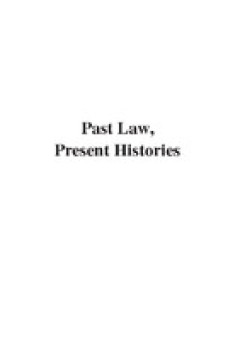
Past Law, Present Histories
This collection brings methods and questions from humanities, law and social sciences disciplines to examine different instances of lawmaking. Contributors explore the problematic of past law in present historical analysis across indigenous Australia and New Zealand, from post-Franco Spain to current international law and maritime regulation, from settler colonial humanitarian debates to effort…
- Edition
- -
- ISBN/ISSN
- -
- Collation
- -
- Series Title
- -
- Call Number
- -
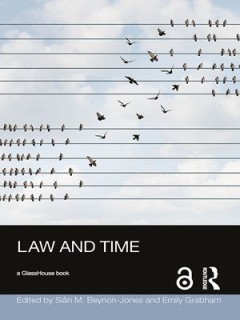
Law and Time
Research on law's relationship with time has flourished over the past decade. This edited collection aims to put law and time scholarship into wider context, advancing conversations on time and temporalities between socio-legal scholars, anthropologists, sociologists, geographers and historians. Through a diverse range of contributions, the collection explores how legal modalities of time emerg…
- Edition
- -
- ISBN/ISSN
- 1351683756
- Collation
- 282 halaman
- Series Title
- -
- Call Number
- 340 LAW
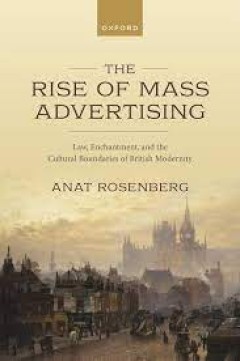
The Rise of Mass Advertising Law, Enchantment, and the Cultural Boundaries o…
This book is a first cultural legal history of advertising in Britain, tracing the rise of mass advertising circa 1840–1914 and its legal shaping. The emergence of this new system disrupted the perceived foundations of modernity. The idea that culture was organized by identifiable fields of knowledge, experience, and authority came under strain as advertisers claimed to share values with the …
- Edition
- -
- ISBN/ISSN
- 9780192858917
- Collation
- -
- Series Title
- -
- Call Number
- -
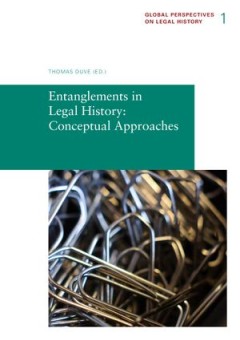
Entanglements in Legal History : Conceptual Approaches
Legal History presents a broad panorama of historical processes that trigger theoretical reflections on legal transfers and legal transplants and on the problem of the reception and assimilation laws and other modes of normativity. In this volume, legal historians across the globe reflect on their analytical traditions and present case studies in order to discuss how entangled histories of law …
- Edition
- -
- ISBN/ISSN
- 9783944773001
- Collation
- 576 halaman
- Series Title
- Global Perspectives on Legal History vol. 1
- Call Number
- 340 ENT
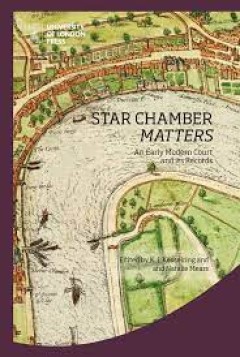
Star Chamber Matters An Early Modern Court and Its Records
An extraordinary court with late medieval roots in the activities of the king’s council, Star Chamber came into its own over the sixteenth and early seventeenth centuries, before being abolished in 1641 by members of parliament for what they deemed egregious abuses of royal power. Before its demise, the court heard a wide range of disputes in cases framed as fraud, libel, riot, and more. In s…
- Edition
- -
- ISBN/ISSN
- 9781912702909
- Collation
- -
- Series Title
- -
- Call Number
- -
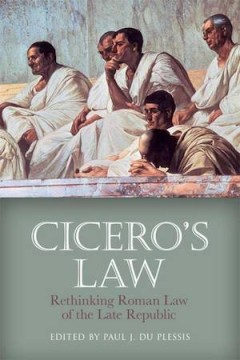
Cicero's Law : Rethinking Roman Law of the Late Republic
This volume brings together an international team of scholars to debate Cicero's role in the narrative of Roman law in the late Republic – a role that has been minimised or overlooked in previous scholarship. This reflects current research that opens a larger and more complex debate about the nature of law and of the legal profession in the last century of the Roman Republic.
- Edition
- -
- ISBN/ISSN
- 9781474408820
- Collation
- -
- Series Title
- -
- Call Number
- 340 CIC
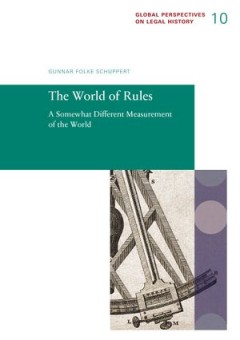
The World of Rules : A Somewhat Different Measurement of the World
"This book takes a stand against the narrowing focus of (German) jurisprudence on state law, rooted in the history of the territorially organised nation state. In the shadow of this tradition, state(-hood) law was only conceived of as state law. However, a gradual decoupling of state and law is observable – not least because of globalisation – which inevitably entails a pluralisation of leg…
- Edition
- -
- ISBN/ISSN
- 9783944773094
- Collation
- 374 halaman
- Series Title
- Global Perspectives on Legal History vol. 10
- Call Number
- 340 SCH w

Jews in Early Christian Law : Byzantium and the Latin West, 6th-11th Centuries
What is the place of Jews in medieval Christian societies? in the ninetheenth and early twentieth centuries, this question was largely confined to Jewish scholars, and the academic debates where inseparable from the upheavels of the lives of contemporary European Jews.
- Edition
- -
- ISBN/ISSN
- 9782503550527
- Collation
- -
- Series Title
- -
- Call Number
- 340 JEW
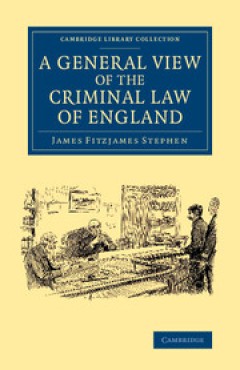
A General View of the Criminal Law of England
The jurist Sir James Fitzjames Stephen (1829–94) published this work in 1863 to provide the intelligent layman with a general account of the workings and principles of English criminal law. He begins with a brief sketch of the development of that law from the Anglo-Saxon period onwards. He then covers the current law on criminal responsibility and the classification and definition of specific…
- Edition
- -
- ISBN/ISSN
- 9781139794886
- Collation
- -
- Series Title
- Cambridge Library Collection - British and Irish History, 19th Century
- Call Number
- -
 Computer Science, Information & General Works
Computer Science, Information & General Works  Philosophy & Psychology
Philosophy & Psychology  Religion
Religion  Social Sciences
Social Sciences  Language
Language  Pure Science
Pure Science  Applied Sciences
Applied Sciences  Art & Recreation
Art & Recreation  Literature
Literature  History & Geography
History & Geography